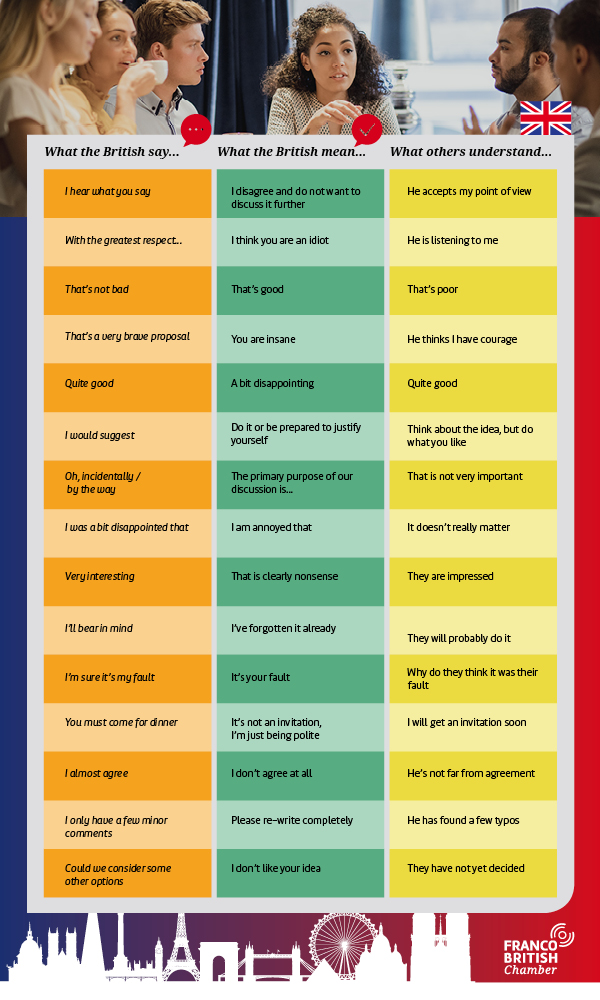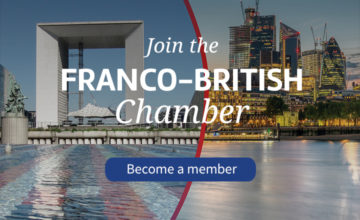A word on cultural differences…
As humans we all share basic needs – food, protection, love, belonging, self-realisation, to name but a few. These needs are innate and are easy to understand.
We then add a layer based on the culture that we grew up in. This is usually done unconsciously, by learning behaviours that allow us to live within our community. These behaviours can vary widely from one group to the next.
The sociologist Guy Rocher defines culture as « A related set of more or less formalized ways of thinking, feeling and acting that, being learned and shared by a plurality of people, serve, in an objective and symbolic way, to build these people into a specific and distinct community.”
These behaviours, or « ways » if we use Guy Rocher’s expression, are more difficult to dissect than the basic needs – especially when we find ourselves in a novel situation, encumbered by our own personal cultural identity.
Whether your franco-british relations are just beginning, or as a refresher of some basic ideas, take a look at the examples below which shed some light on our cross-channel differences. And when you’re faced with a cultural difference, be curious and remember that variety is the spice of life!

SOME ADVICE FOR FRENCH BUSINESS PEOPLE WORKING WITH THE BRITISH
1/ Recruitment and management
Respect regional differences
Don’t mistake everybody as “English”, remember that Irish, Scots and Welsh all have their own national identity and are very attached to it.
It’s OK for all of these regions to take part in “English bashing” by poking fun at the English – it’s a national sport. And to be fair, the English get their own back by making fun of regional accents.
Be a team player
Most British people will have experienced a good amount of team sports at school (rugby, football, hockey, basketball, netball to name but a few). This is meant to build team spirit and to a certain extent it does. Notions of what’s a team and playing your role in the team’s success are well understood. This has also resulted a developed sense of “fair play” – which of course will always depend on which side you’re looking from…
Be open-minded about qualifications
Remember that in the UK vocational qualifications are not that important (particularly at the start of your career). Sometimes the subject that somebody has studied at university has no relation to their chosen profession.
It’s not unusual for an Accountant to have majored in History for example, before being trained by his employer. This would be very unusual in France. Therefore, don’t expect people to have studied something related to their job title.
The advantage of this is that it means that it’s easier for people to change roles. Also, as the employment laws are more flexible in the UK, employers are more willing to experiment and to give people a chance to try something new.
Be practical
Be practical in your negotiations and look for solutions. The British are most likely to look for a compromise rather than a perfect solution that will take a long time to implement.
Have a good sense of humour
Have a good sense of humour and be able to make and take jokes about yourself (within reason of course!). If you’re the boss, expect people to banter with you and to provoke you. You should take it all in your stride.
With women, don’t be excessively gallant
Treat women as colleagues. Some behaviours that you may think are gallant, may be looked on as sexist. Be polite, but don’t go overboard to open doors etc. and don’t make exceptions for a woman that you wouldn’t make for a man.
2/ British behaviours and traditions
Understanding understatement
The British are masters of understatement, or the art of lowering the emotional charge of their words, so sometimes it can be difficult to understand exactly what they mean. They don’t like to say “No”, so will try and find ways of making you understand that they don’t really agree. They may refer to something as “interesting” when what they really mean is that your idea is completely off the wall.
This can also be illustrated in their behaviour, where they are unlikely to make too much of a title or a position (unless it’s a member of the Royal Family!). This is probably a left over from the days of the aristocracy where people knew a person’s position because of their accent or the school they’d been to. Although the class system is less prevalent, there are still a lot of leftovers. The British can often identify a compatriot’s origins, or education very rapidly and may make that understood by a passing comment.
Emotions in both personal and professional relationships
In the United Kingdom people are raised not to bother others with their feelings or emotions. This explains why it is often difficult for the French to fully understand what’s going on for their British counterparts.
Food
Remember that tea in England is usually strong “breakfast tea” and is usually served with milk. Don’t expect to be offered a wide variety of teas, unlike in France. Coffee is also served with milk. Otherwise ask for it black.
If you have a lunch meeting it could well be sandwiches. Don’t be offended!
When dining out, don’t be surprised if you’re offered cheese after your dessert. Just accept that it’s a British custom. And furthermore, if the cheese is Stilton, it will probably be served with a glass of Port. Don’t ask!

Some common misconceptions about British food
In Great Britain, food has evolved massively since the 60s (thank goodness!) People eat a wide variety of fruit and vegetables, lots of roast meats (notably the renowned Angus beef) and also game meat. There are many excellent desserts made out of fruits, meringues and cream. Organic foods are easy to find, as are vegetarian and vegan dishes.
TIPS FOR THE BRITISH LOOKING TO WORK WITH THE FRENCH
The Working Week
For the British person coming to France, don’t think that the French take 3-hour lunches every day plus the whole of August on vacation. The French working day is actually quite long and it’s not unusual for people to leave work at 7pm or later.
In spite of this, you will also hear people talking about “RTT”, so what are these? They are extra days of leave that correspond to the reduction of the working week to 35 hours that was introduced in 2000.
Wearing your heart on your sleeve
Don’t be phased out if people get emotional in a work context. The French are much freer with their emotions and can get angry or sad and upset at work without feeling embarrassed. The strength of their emotions may not be on the same scale as a British person’s emotions.
Being the Boss
If you’re the boss, you will have to attach a certain amount of importance to your role. People will expect you to take advantages of any privileges you might have. If you don’t want to take advantage of them, then take time to explain that. Otherwise, people may think that you’re not confident that you’re the right person for the job.
Experts
Expect people to ask you questions about your “expertise”.
Why are you the right person for the job? What did you study? Are your studies directly related to the job you’ll be doing? (see above).
Also, bear in mind that France has a huge number of engineers (ingénieurs) in many different domains. This is directly related to the importance of maths within the French education system and the prestigious reputation of engineering schools which can be compared to that of Oxford or Cambridge university.
Religious Symbols
In France people are very sensitive to signs of religious allegiance. Due to the laws on laicity (separation of the church and the state) it is not usually acceptable to wear religious items in the workplace unless specified. This is particularly the case in government institutions.
We would like to thank WALDEN COACHING, who has been supporting managers and executives since 2015 on their professional challenges – interculturality, development and transformation – for writing these main Franco-British cultural differences.
http://waldencoaching.fr
Contact: Jo Leymarie jo@waldencoaching.fr







